Written by Madeleine Shaw, (Dartmouth College), Student Correspondent for CET Jordan, Fall 2023
For my last blog post before heading back to the States, I thought I would give readers a peek into Jordan’s culture of hospitality, something that has made my time here extra special. The level of care for guests in Jordan is likely a foreign concept to many Americans, yet something so innate to the local culture that Jordanians cannot fathom its absence.
Jordanian hospitality is strangers inviting you to their homes after a two-minute conversation and having qahwa (Arabic coffee) at the ready for the unknown guest. It is munching on kanafa, a popular and equally delicious cheese-based dessert, while getting to know a Jordanian family. It is a taxi driver, upon hearing that my classmates and I were studying Arabic, calling his wife to have her vouch for his offer to cook us the best mansef in the world. I thought I’d take this opportunity to highlight a few of my favorite memories of Jordanian hospitality, although there is surely not enough space permitted in this blog post to share all of the wonderful experiences I’ve had here in Jordan.
Family Dinner with my Language Partner
Clutching a box of chocolates while attempting to formulate appropriate pleasantries, I was excited yet nervous to visit my language partner Mais’s home for the first time. Luckily, all my fears were assuaged when Mais’s family warmly welcomed me inside and announced that I was now part of their family. We devoured a tasty home-cooked meal of musakhan—a Palestinian dish comprised of roasted chicken and pita cooked with onions, sumac, and pine nuts. I found myself offered qahwa, chai, and a bounty of sweets by my language partner in her beautiful غرفة الضيوف (guest room), a sitting room dedicated explicitly to hosting visitors. Despite being truly full, Mais’s family insisted I have kanafa to top off the evening, and drove to the store to fetch me some.
Just a few days later, Mais’s grandmother invited me to a dinner of dawali a traditional stuffed grape-leaf dish, with her extended family. I found myself surrounded by Mais’s brothers, aunts, uncles, and cousins as her grandma insisted I sit at the head of the table and encouraged me to eat with phrases like “يلا” and “كلي.” Surprised that I do not live close to family in America, they told me that they are now my Jordanian family and that I am welcome whenever I return to Jordan.
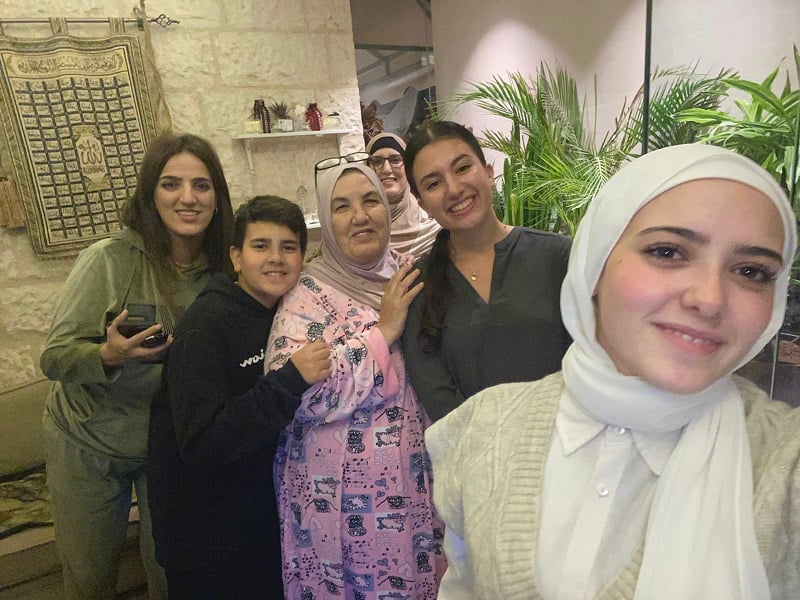
My language partner, Mais, takes a selfie with me and several members of her family after they generously welcomed me into their house for a delicious home-cooked meal. I’ll never forget her family’s warmth and hospitality, and I hope to emulate their generosity for guests when I return to America.
Attending a Jordanian Wedding
In no world would a cohort of twenty-some foreign students be invited to a wedding in America. On the contrary, another remarkable aspect of Jordanian hospitality is that Jordanians will invite you to everything! To my surprise and absolute delight, my professor generously invited all of us to her brother’s wedding celebration this past weekend. Ushered into an elevator to take me to the women’s hall (Jordanian weddings are typically separated by gender), the wedding guests in the elevator immediately welcomed me into their family even after learning that I, in fact, had no familial relations to either the bride or groom.
My classmates and I danced, sang, clapped along, and snacked on sweets with my professor and her family in a beautiful ballroom complete with spotlights and firecrackers. Although I won’t reveal all the secrets of Jordanian weddings (you’ll have to go yourself someday), I’ll tell you there was no shortage of fun, from dancing with the bride to exchanging contact information with new friends!
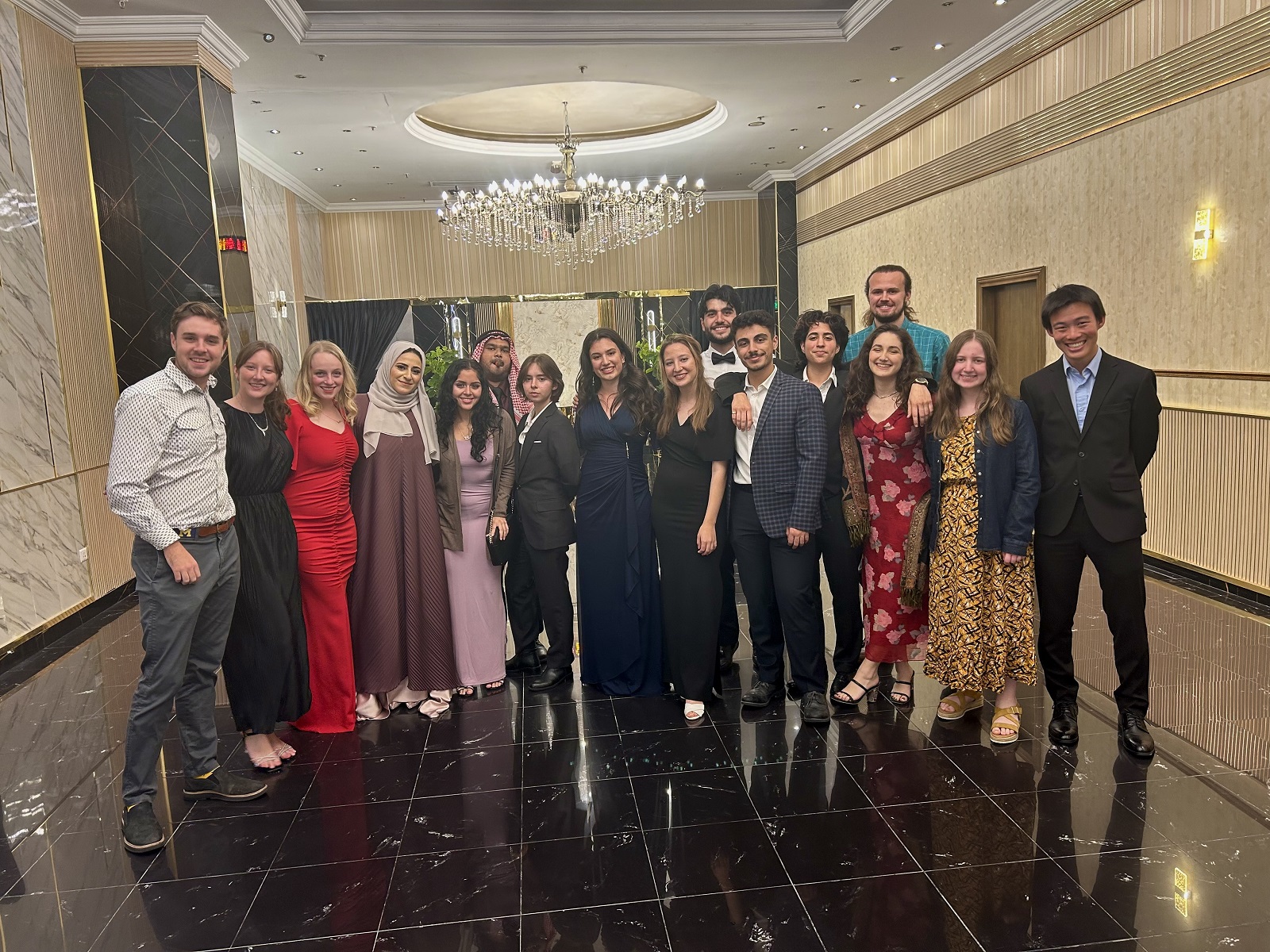
My classmates and I pose together after dancing and singing our hearts out at my professor’s brother’s wedding this past weekend. There’s nothing like a Jordanian wedding, especially after a long week of Arabic homework!
Cooking with our Jordanian Neighbors
Every week, our jiran (Jordanian neighbors) plan activities for my CET classmates to expose us to Jordanian culture and help us practice the language with native speakers. Last week, several neighbors invited us to their apartment to cook maqlouba, a famous Jordanian dish that literally translates to “upside-down.”
After buying ingredients, cutting vegetables, frying chicken, and waiting impatiently for the rice to cook, we successfully flipped the dish (pictured below) and chowed down. Of course, no Jordanian home visit would be complete without chai and, in this case, lots of dabke (a traditional Levantine group dance) and dance lessons from our neighbors. I left their apartment with a full stomach and a full heart.
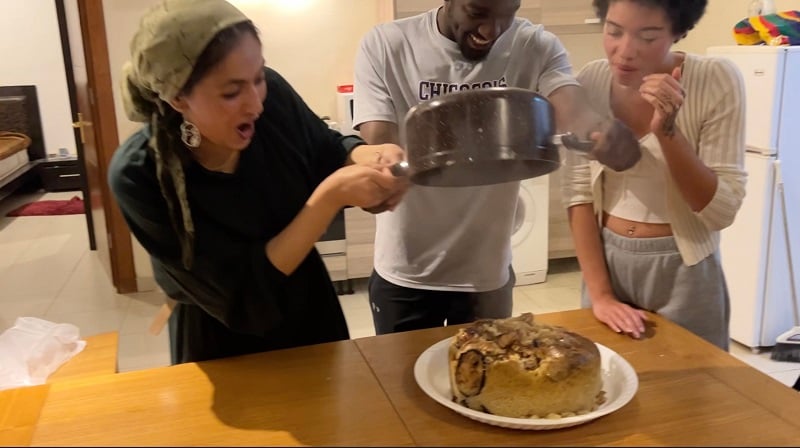
My classmates and neighbor react to the maqlouba (a Jordanian dish made of chicken, rice, and fried vegetables) that they’d just flipped. Trust me, it tasted even better than it looks!
Exploring As-Salt with a Local
This past weekend, my friend Sarah and I met up with her professor in As-Salt, a small yet vibrant town located just 45 minutes from Amman. Her professor graciously agreed to give us a tour of her hometown’s beautiful streets, which we wandered through on a beautiful weekend day. Stopping in handicraft stores and speaking with locals, we learned of As-Salt’s history of religious harmony and hospitality between Christian and Muslim residents that has garnered the town’s UNESCO heritage status.
After our tour of the town, we devoured hummus and admired the sunset together at the gorgeous Al-Quds View Cafe, from which you can see the hills of Jerusalem! My friend’s professor then insisted on introducing us to her sister at her family home, where we were immediately greeted with qahwa, a house tour, and plenty of family lore. As all the best days do, our lovely trip to As-Salt concluded with kanafa and our attempts at singing our favorite Arabic songs.
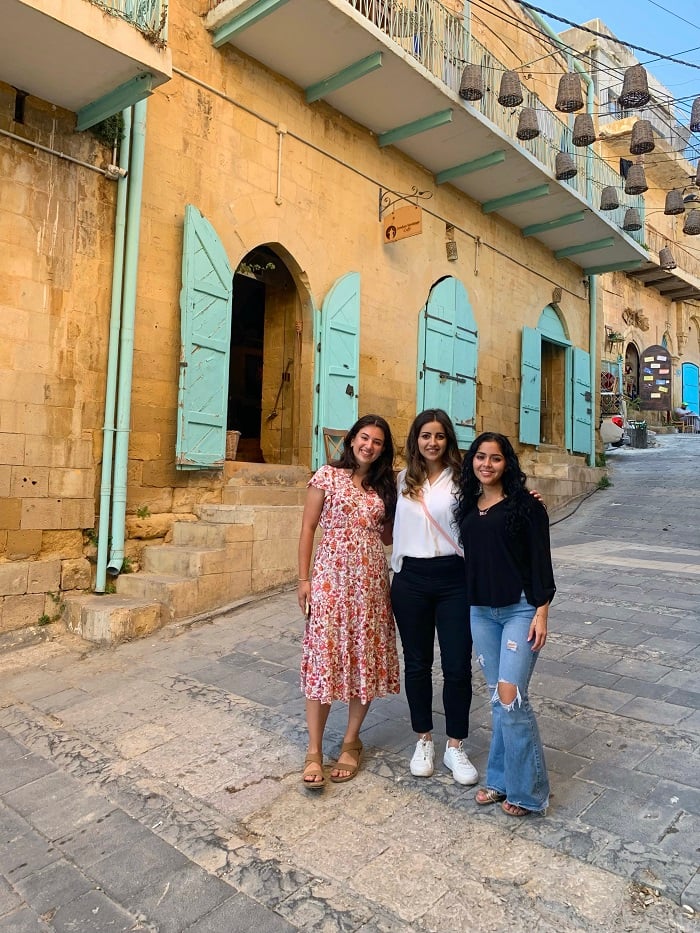
My friend Sarah and I pose with her professor on one of As-Salt’s gorgeous streets. She had graciously offered to tour us around her hometown this past weekend, during which we visited local shops, watched the sunset at a beautiful café, drank qahwa with her sister’s family, and savored kanafa to close out the evening.
Language Insight: Expressions of Gratitude
As I wrap up this blog post, I thought I’d share some common expressions of gratitude—words that I use when visiting a Jordanian home, meeting someone new, or thanking a café employee. My hope is that if you are fortunate enough to visit, study, or live in Jordan at some point in your life, this list may be helpful to you.
Thank you = shukran (شكراََ)
Thank you very much = shukran jazeelan (شكراََ جزيلاً )
May God give you health = yatikum al afiya (يعطيكم العافية)
May God bless your hands = yaslem adikum (يسلم اديكم)
May your house always be full = baitkum amr (بيتكم عامر)
‘Always’ literally, or may there always be food in your home = dayma (دايمه)
With that, شكراََ جزيلاً for reading my blog posts this term, it’s been a pleasure. يعطيكم العافية!
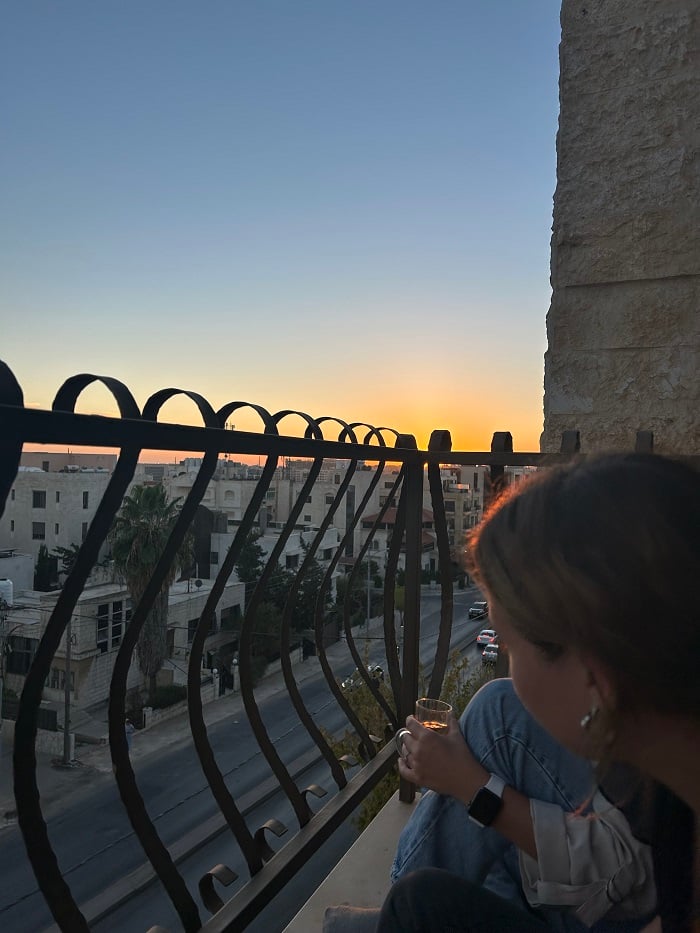
My CET friends and I enjoy a wonderful Jordanian sunset on our balcony—a routine habit that I’ll dearly miss.